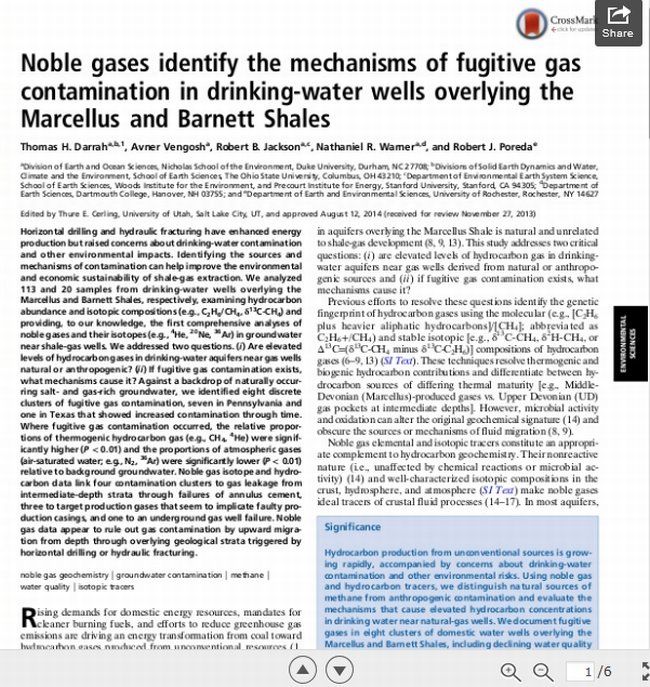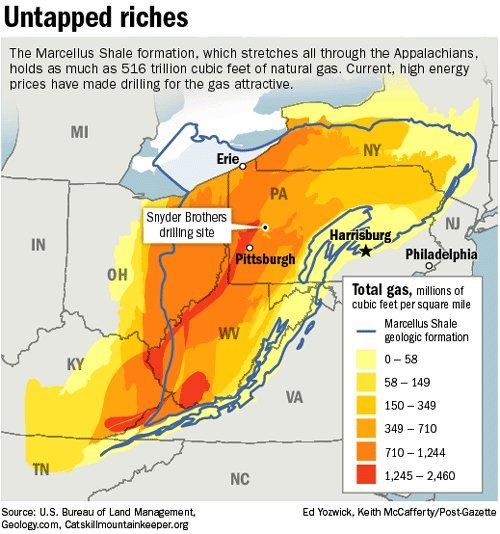No one's gonna give up venturing on the streets for that ugly but unsurpassable truth.
So no one should give up fracking. Especially not when, apart from ensuring a steady energy supply for decades to come, it will in the same manner dry up the financial resources of those who finance international islamic terrorism and the spreading of wahhabi ideology - primarily Iran and Saudi Arabia.
Over at American Thinker, Jeffrey Folks convincingly makes the case for fracking:
"...The science is settled, as the climate change supporters like to say. Only this time, science confirms the safety of hydraulic fracturing. According to a new study published by the National Academy of Sciences, fracking is safe. End of discussion.
Funded by the National Science Foundation and Duke University, a team of scientists at Ohio State and other universities conducted extensive research into the purported link between groundwater pollution and fracking. (The full title of the report, available online, is “Noble Gases Identify the Mechanisms of Fugitive Gas Contamination in Drinking-Water Wells Overlying the Marcellus and Barnett Shales.”) In an examination of 130 wells, the researchers found that, when properly conducted, no groundwater or aquifer pollution resulted from the practice of fracking itself.
Among the 130 wells studied, the researchers found only a subset of cases, including seven in Pennsylvania and one in Texas, in which faulty well construction or cementing was to blame for the seepage of gases into groundwater. According to Professor Avner Bengosh of Duke University, “[t]hese results appear to rule out the migration of methane up into drinking water aquifers from depth because of horizontal drilling or hydraulic fracturing.” That is to say, in the rare cases where it occurs, gases are entering the water supply from outside the borehead as a result of faulty well construction or poor cementing, both of which are manageable problems.
In their research, the scientists subjected the fracked well sites to a newly developed process of “geochemical forensics” using noble gases to determine whether pollution in proximity to a drilling site is naturally occurring or associated with drilling. The process was also able to determine whether the release of gases resulted from fracking itself or from seepage around well casings – an uncommon and correctable problem. As Thomas Darrah, the lead scientist in the study, stated, “most of the issues we have identified can potentially be avoided by future improvements in well integrity.”
While the new report answers the most important question, proving beyond doubt that fracking itself does not cause gas to seep into the water supply, it does not address several other important questions. One of these is the frequency of contamination of water supplies by naturally occurring petroleum, methane, and other gases.
Natural pollution of this kind would seem to be extremely common, and in fact this natural process has been known for millennia. At sites where petroleum seeped to the surface, as in the vicinity of the 19th-century Drake oil field in Pennsylvania, Native Americans had made use of the oily substance as a lubricant for hundreds if not thousands of years. That oil, flowing naturally to the surface, was “contaminating” nearby streams and groundwater.
Similarly, at thousands of hot springs and other sites, methane and other gases, including ammonia and helium, are released naturally into the environment, as for example in Yellowstone National Park. The release of methane from the ocean floor is also a pervasive feature of the natural environment. In comparison with these widespread and perennial sources of methane contamination, the amount of gas released by faulty oil and gas wells is infinitesimal. It would be helpful if some future researcher provided more precise data, but the ratio of man-made to natural release of gases is certainly miniscule.
Even if the oil industry achieved a 100% safety record with the construction of casings and cementing of wells, or even if no drilling at all were to take place, vast amounts of methane and other “polluting” gases would seep into groundwater and aquifers as a result of natural processes. The same is true of deepwater drilling: enormous methane emissions take place all the time in the seabed. Earthquakes and volcanoes, both above ground and underwater, release huge quantities of gases into the environment on a regular basis. A study of a single quake that occurred in Pakistan in 1945 proved that the event had released 10 million cubic yards of gas over a period of seven decades, and that the fracture resulting from the quake continues to emit methane.
What humans add to natural emisions as a result of drilling is so minor as to be of little consequence. If some future study confirmed this fact, it would help to counter the myth that oil and gas drilling is polluting an otherwise pure land and sea environment. The reality is that wherever shale and other carbon-rich formations occur, natural leakage of petroleum and/or methane is inevitable. Oil and gas are naturally occurring features that are constantly interacting with the environment and entering the water supply through natural processes. As is so often the case, the idea that there once existed an environment free of all that modern intellectuals might consider unpleasant is simply a fantasy..."
You can find the link to the Ohio State University report here.

We reported on the anti-fracking craze over one year ago here. Some readers may recall our post on the anti-fracking movie Promised Land, starring Matt Damon. Promised land had been partly financed by a media company wholly owned by the United Arab Emirates, an OPEC member.
Even more damningly, and completely in line with the above assertions that natural emissions and contamination far outweigh "what humans add", we also posted a video in which Josh Fox, producer of the anti-fracking documentary Gasland, admitted that Pennsylvanians were able to light the water coming from their taps decades before fracking even started.
Now that the report by the Ohio State University scientists is out, I wonder if Matt Damon or Josh Fox will backtrack?
Count on it.
Not.
MFBB.

No comments:
Post a Comment